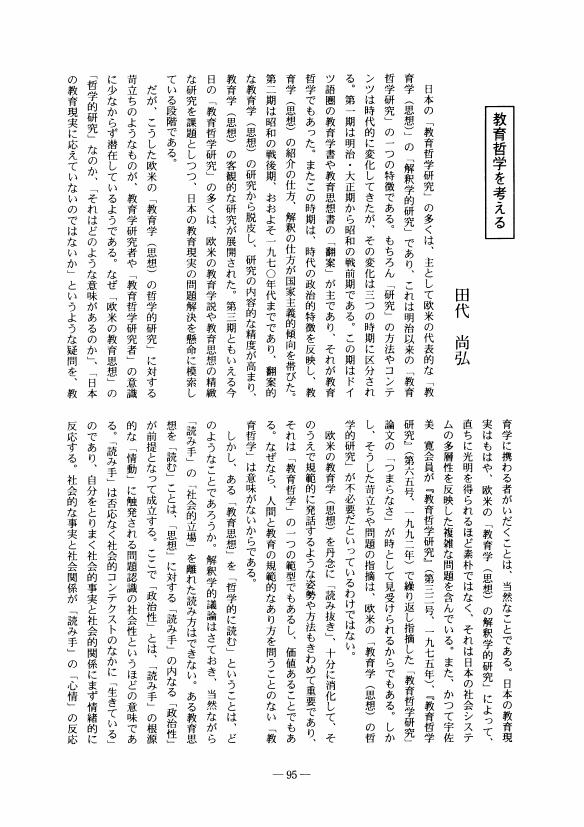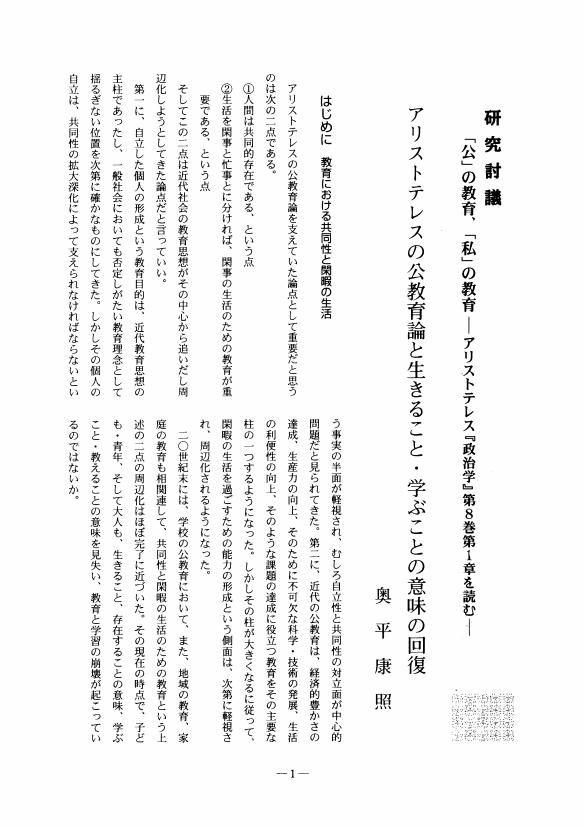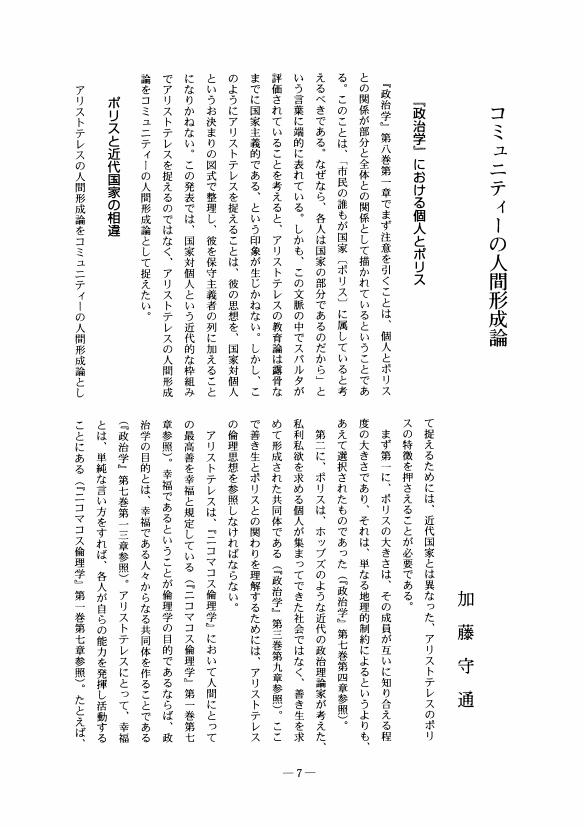1 0 0 0 OA 他者と「出会う」地平 理解の超越と理解の暴力性に関しての一考察
- 著者
- 高橋 舞
- 出版者
- 教育哲学会
- 雑誌
- 教育哲学研究 (ISSN:03873153)
- 巻号頁・発行日
- vol.2003, no.87, pp.46-66, 2003-05-10 (Released:2010-05-07)
- 参考文献数
- 51
This paper clarifies the mechanism of “meeting”, and defines the role of education for preparing human beings for rich possibilities in “meeting”.O. F. Bollnow regards “meeting” as an accidental gift which defies any methodological treatment in education. At the same time, he attaches educational significance to “self-revelation” as provided by “meeting”. On the basis of contemporary issues of “independence from colonialism”, the author will take up another feature of “meeting”, that is, the educational significance of the “existence of others”. Moreover, the author will examine “meeting” from the point of view of human responsibility, by asking a question : “Why do human beings often fail to meet in day-to-day situations?” The failure to meet derives from the nature of “understanding”. While each language can give expression only to what transcend human sensibilities, human beings would understand “the other's” language within their own limited recognition. As a consequence, the “otherness” of “the other” does not emerge, thus hampering the “meeting”. Therefore, the author would like to suggest, first, that people become conscious of the limitations of languages, and exert their “control of understanding”.Second, by analyzing the cases of “meeting”, the author will examine the validity of the “control of understanding” as a useful tool for “meeting”. The analysis shows that the “meeting” ensues from “self-revelation” which Bollnow has found educationally significant. In order to highlight this process of “self-transformation”, the author will name it “self-metamorphosis”.Third, to provoke “self-metamorphosis”, one must understand “the other”. By meeting “the other” in the realm outside of one's understanding, one's understanding will be overthrown and be reversed. “Understanding” is necessary to “meet” the other, and those acts without understanding may turn into “violence”. At this point, the “control of understanding” and the “requirement of understanding” may strike some as inconsistent. In fact, both “understanding” and “less understanding” are violence, and the author will indicate that a life in the midst of such a dilemma will cultivate humanity which will promote rich possibilities in “meeting”.Finally, the author will criticize Bollnow's idea that the “meeting occurs only among the existences”. “The other” is the existence which goes beyond one's understanding, and which entails one's “self-metamorphosis”. Thus, Bollnow's idea of “the other” cannot be mere existences (without essential attributes). “The other” may either have its attributes or it may be merely existential. The author will insist that the open attitude to any possibility of “the other” holds an important role to play in education.
1 0 0 0 OA ミメーシスによる教育の再構築 野生児についての語りを手がかりに
- 著者
- 久保田 健一郎
- 出版者
- 教育哲学会
- 雑誌
- 教育哲学研究 (ISSN:03873153)
- 巻号頁・発行日
- vol.2003, no.87, pp.67-82, 2003-05-10 (Released:2010-05-07)
- 参考文献数
- 26
The present paper pursues the possibility of contemplating about education or about the human being, even after the death of the human and of the concomitant death of their education. Such an attempt will pose a fundamental challenge to conventional thinking because the former tries to contemplate about those concepts posthumously. A new concept of education replete with novel possibilities is expected to emerge.For this purpose, the author will present, firstly, as an alternative to the conventional super-historical pedagogy, the design of historical-pedagogic-anthropology. This anthropology regards the object of analysis as an historical construct. Then, from the standpoint of historical-pedagogic-anthropology, he will restore mimesis, which had been banished from the educational domain to the aesthetic one, in an educational, and especially in educators', domain. By analyzing the narration about a wild child from the point of view of mimesis, one can witness humanism, which underpinns the concept of education, disintegrate from within. Nonetheless, the collapse of humanism is not the collapse of education itself. With the affirmation of the difference between those who educate and those who are educated, there will be revived anew the concept of education.
1 0 0 0 OA 『学校と社会』 (The School And Society) の上野陽一訳をめぐって
- 著者
- 毛利 陽太郎
- 出版者
- 教育哲学会
- 雑誌
- 教育哲学研究 (ISSN:03873153)
- 巻号頁・発行日
- vol.2003, no.87, pp.83-94, 2003-05-10 (Released:2009-09-04)
- 参考文献数
- 37
1 0 0 0 OA 教育哲学を考える
- 著者
- 田代 尚弘
- 出版者
- 教育哲学会
- 雑誌
- 教育哲学研究 (ISSN:03873153)
- 巻号頁・発行日
- vol.2003, no.87, pp.95-96, 2003-05-10 (Released:2009-09-04)
1 0 0 0 OA 柳沼良太著 『プラグマティズムと教育-デューイからローティへ』
- 著者
- 早川 操
- 出版者
- 教育哲学会
- 雑誌
- 教育哲学研究 (ISSN:03873153)
- 巻号頁・発行日
- vol.2003, no.87, pp.97-99, 2003-05-10 (Released:2009-09-04)
アメリカの哲学者であり教育学者でもあったジョン・デューイが逝去してから五十年が経過した.アメリカでは、一九八〇年代に始まったデューイ哲学再発見の動きによって、その後多くの研究書が出版されている。本書『プラグマティズムと教育』は、このような研究動向を踏まえ、独自の視点からわが国の教育哲学研究に新たな洞察を加えようとする若手研究者の意欲的著作である。
1 0 0 0 OA 広瀬俊雄著『教育力としての言語-シュタイナー教育の原点』
- 著者
- 今井 重孝
- 出版者
- 教育哲学会
- 雑誌
- 教育哲学研究 (ISSN:03873153)
- 巻号頁・発行日
- vol.2003, no.87, pp.100-101, 2003-05-10 (Released:2010-01-22)
1 0 0 0 OA アリストテレスの公教育論と生きること・学ぶことの意味の回復
- 著者
- 奥平 康照
- 出版者
- 教育哲学会
- 雑誌
- 教育哲学研究 (ISSN:03873153)
- 巻号頁・発行日
- vol.2003, no.87, pp.1-6, 2003-05-10 (Released:2009-09-04)
- 参考文献数
- 1
1 0 0 0 OA コミュニティーの人間形成論
- 著者
- 加藤 守通
- 出版者
- 教育哲学会
- 雑誌
- 教育哲学研究 (ISSN:03873153)
- 巻号頁・発行日
- vol.2003, no.87, pp.7-11, 2003-05-10 (Released:2009-09-04)
1 0 0 0 OA 「教育的」公共性のアポリアとアリストテレス
- 著者
- 西村 拓生
- 出版者
- 教育哲学会
- 雑誌
- 教育哲学研究 (ISSN:03873153)
- 巻号頁・発行日
- vol.2003, no.87, pp.12-16, 2003-05-10 (Released:2009-09-04)
- 参考文献数
- 1
1 0 0 0 OA 総括的報告
- 著者
- 宮寺 晃夫
- 出版者
- 教育哲学会
- 雑誌
- 教育哲学研究 (ISSN:03873153)
- 巻号頁・発行日
- vol.2003, no.87, pp.17-22, 2003-05-10 (Released:2009-09-04)
1 0 0 0 OA ニーチェの教養批判と言語批判
- 著者
- 今井 康雄
- 出版者
- 教育哲学会
- 雑誌
- 教育哲学研究 (ISSN:03873153)
- 巻号頁・発行日
- vol.2003, no.87, pp.23-28, 2003-05-10 (Released:2009-09-04)
現在のわれわれの「教養」をめぐる議論を、「ニーチェ」という場所から眺望してみる、というのが本報告の目論見である。
1 0 0 0 OA 語り続ける力としての〈教養〉 物語論的人間研究の視点から〈教養〉を考える
- 著者
- 鳶野 克己
- 出版者
- 教育哲学会
- 雑誌
- 教育哲学研究 (ISSN:03873153)
- 巻号頁・発行日
- vol.2003, no.87, pp.29-34, 2003-05-10 (Released:2010-05-07)
- 参考文献数
- 12
1 0 0 0 OA 「教育」できるものとしての「教養」の語り方 教養論の歴史から
- 著者
- 松浦 良充
- 出版者
- 教育哲学会
- 雑誌
- 教育哲学研究 (ISSN:03873153)
- 巻号頁・発行日
- vol.2003, no.87, pp.35-39, 2003-05-10 (Released:2009-09-04)
- 参考文献数
- 13
1 0 0 0 OA 教育哲学を考える
- 著者
- 宮寺 晃夫
- 出版者
- 教育哲学会
- 雑誌
- 教育哲学研究 (ISSN:03873153)
- 巻号頁・発行日
- vol.2002, no.86, pp.30-31, 2002-11-10 (Released:2009-09-04)
1 0 0 0 OA 教育哲学者国際連絡会・第八回大会に参加して
- 著者
- 丸山 恭司
- 出版者
- 教育哲学会
- 雑誌
- 教育哲学研究 (ISSN:03873153)
- 巻号頁・発行日
- vol.2002, no.86, pp.32-36, 2002-11-10 (Released:2009-09-04)
教育哲学者国際連絡会 (the International Network of Philosophers of Education : 以下、INPE) 第八回大会が「教育哲学のさまざまな顔 : 伝統、問題、挑戦」というテーマで二〇〇二年八月八日から一一日までの四日間ノルウェーのオスロにて開催された。二年に一度のINPE大会に以前から参加したいと考えていた。今回ようやくその希望がかない、はじめて参加することができた。以下はその報告である。
- 著者
- 安田 忠郎
- 出版者
- 教育哲学会
- 雑誌
- 教育哲学研究 (ISSN:03873153)
- 巻号頁・発行日
- vol.2002, no.86, pp.37-48, 2002-11-10 (Released:2009-09-04)
1 0 0 0 OA 宇佐美寛著『宇佐美寛・問題意識集』 (1~5)
- 著者
- 藤井 千春
- 出版者
- 教育哲学会
- 雑誌
- 教育哲学研究 (ISSN:03873153)
- 巻号頁・発行日
- vol.2002, no.86, pp.49-55, 2002-11-10 (Released:2009-09-04)
1 0 0 0 OA 西村晧・牧野英二・舟山俊明編『ディルタイと現代』
- 著者
- 田代 尚弘
- 出版者
- 教育哲学会
- 雑誌
- 教育哲学研究 (ISSN:03873153)
- 巻号頁・発行日
- vol.2002, no.86, pp.56-58, 2002-11-10 (Released:2009-09-04)
1 0 0 0 OA 岡田敬司著 『教育愛について-かかわりの教育学III』
- 著者
- 中田 基昭
- 出版者
- 教育哲学会
- 雑誌
- 教育哲学研究 (ISSN:03873153)
- 巻号頁・発行日
- vol.2002, no.86, pp.59-60, 2002-11-10 (Released:2009-09-04)
1 0 0 0 OA 京都大学高等教育教授システム開発センター編『大学授業研究の構想-過去から未来へ-』
- 著者
- 桜井 佳樹
- 出版者
- 教育哲学会
- 雑誌
- 教育哲学研究 (ISSN:03873153)
- 巻号頁・発行日
- vol.2002, no.86, pp.61-62, 2002-11-10 (Released:2009-09-04)














